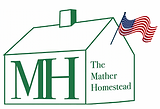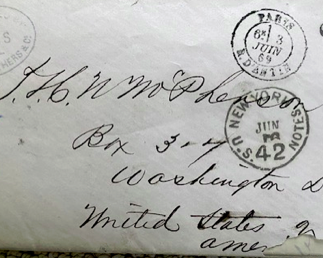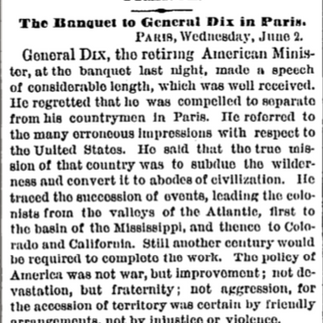The French Connection. An 1869 Letter from Samuel McPherson to his brother Theodore
- Donn Smith

- Feb 8, 2023
- 3 min read
When letters and printed materials were removed from the attic and sorted, one letter defied categorizing. It did not relate to the Mathers, Darien, or the National Parks. It was a letter sent from Paris on the 3rd of June 1869 by Samuel Henderson McPherson to his brother Theodore Horatius Nevin McPherson in Washington DC.
Reynolds McPherson (1794-1847) was the great-grandfather of Edward R. McPherson Jr., the husband of Bertha Mather McPherson. Reynolds McPherson had six sons. (The second son, John Williamson McPherson was Edward R. McPherson Jrs.’ grandfather.)
The ten-page handwritten letter offers a look at the mores, etiquette, prejudices, and considerations of the time. The letter begins as Sam, the youngest son of Reynolds McPherson, speaks to Theodore about their brother Edward’s (George Edward McPherson) recent engagement…
I received your letter yesterday of the 20th of May and also one from Ed. Ed is indeed engaged to be married, so he tells as he did you. I have met Miss Higginson and think her a very nice lady, but not at all handsome. I only met her once and of course can form no opinion of her merits. She seemed to me to be a lady of great gentleness and sweetness of disposition… I know nothing about her family connections, but think that she is a niece of Dr. Ting’s (sic) of New York, the Episcopal minister of low-church notoriety. I am not certain about this but think it strange that Edward did not inform something about her family connections…
OF NOTE: The Dr. Ting referred to was Stephen Higginson Tyng, Jr., son of the Reverend Stephen Tyng for whom Stephen Tyng Mather received his middle name. In 1868 Dr.Tyng Jr. was embroiled in a trial held by the Episcopal Diocese of New York for violating specific canons of the Church.
ALSO OF NOTE: George Edward McPherson did marry Lucy Maynard Higginson less
than a year after Sam’s letter, on 2 May 1870.
Sam continues with suggestions for Theodore (1836-1900) as well…
…You should yourself when you can see your way clear marry. You have time yet but still I am satisfied you would live much happier with a charming and devoted companion. Life is a reality and I think the married state is the normal condition of man and woman…”
OF NOTE: Theodore H.N. McPherson never married.
Sam then goes on to discuss certain Americans in Paris…
…I see a great many gay and worldly women (Americans) abroad. Oh what trash “shoddy contracts” have thrown up on the face of society. You see it here. cold, selfish, and ignorant-nothing but their money to recommend them.
OF NOTE: “Shoddy contracts” was an epithet for those businessmen who grossly profited from the Civil War being awarded lucrative wartime contracts and delivering shoddy goods.
Sam then continues…
“The Americans of Paris…gave a dinner for General Dix, on the evening of the 1st. You will see all about it in the papers before this letter reaches you. It was a rather fine affair…”
OF NOTE: General John Adams Dix was the U.S. Minister to France from 1866-1869. He had been a Major General in the Civil War and later Governor of New York. Ft. Dix is named in his honor.
Perhaps Sam McPherson’s harshest criticism is reserved for a Mr. W. Pembroke Fetridge….
You have perhaps heard of W. Pembroke Fetridge… He is a most unmitigated squish and some very good Americans would not attend this dinner because this fellow and some others like him were the officious managers on one of the committees. This Fetridge…is the inventor of the “Balm of a Thousand Flowers” a quack hair oil. This man assumes to lead the American society in Paris. It is disgraceful. However he doesn’t lead the best resident Americans,
he only feeds upon strangers who don’t know him…
How this one letter from more than 150 years ago came to the Homestead and why it was saved can only be guessed. However, it, like so many other attic discoveries, gives dimension to lives that were lived with the fullness of human hopes, foibles, and feelings













Comments